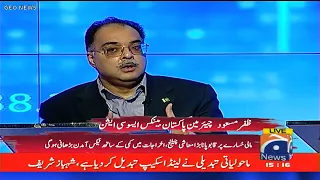Zafar Masud with Shahzeb Khanzada on Great Debate Geo News
In the video of Zafar Masud with Shahzeb Khanzada, Mr. Zafar Masud discusses Pakistan’s economic crisis. Masud considers this a critical moment and urges Pakistan to become self- reliant. He suggests improving tax collection and eliminating wasteful subsidies to strengthen the economy. He also emphasizes supporting the private sector for growth.
Pakistan’s economic woes came under scrutiny during a recent episode of Geo News’ “Great Debate.” Host Shahzaib Khanzada pressed prominent Banker and recently elected Chairman Pakistan Bank’s Association Zafar Masud for solutions, and Masud’s response painted a picture of a nation at a crossroads.
In the discussion, Zafar Masud with Shahzeb Khanzada, Masud emphasized the urgency of the situation, declaring this a critical moment for Pakistan’s economic well-being. He argued that a continued reliance on handouts from foreign allies is unsustainable due to shifting global dynamics and the potential for decreased foreign support.
This grim reality, according to Masud, necessitates a paradigm shift towards self-reliance. His proposed solution is a two-pronged attack on Pakistan’s fiscal woes.
The first thrust targets inefficiencies in the tax system. Masud highlighted a staggering 3.5 trillion rupee gap in tax collection, pinpointing real estate, agriculture, and retail as sectors with significant untapped potential. He argued that stricter tax compliance measures could significantly bolster government revenue.
See also: Fix Fiscal Account to Tame Inflation
The second prong tackles the issue of wasteful subsidies. Masud heavily criticized the current system, labeling it “untargeted” and a “drain on resources.” He specifically targeted indirect subsidies in energy and food sectors, arguing that these trickle-down models often fail to reach their intended beneficiaries. Instead, Masud advocated for a shift towards direct subsidies, believing them to be “more beneficial, effective, and productive.”
See also: Challenges, Opportunities and Pakistan’s Path Forward
Beyond these measures, in the dialogue of Zafar Masud with Shahzeb Khanzada, Masud underscored the private sector’s crucial role as the driving force behind Pakistan’s economic engine. He called for fostering public-private partnerships (PPP) across various sectors, from pensions to development projects. By empowering the private sector, Masud argued, Pakistan can unlock long-term economic growth.
The discussion of Zafar Masud with Shahzeb Khanzada offered a glimmer of hope amidst the urgency. Masud emphasized that Pakistan has the capacity to address these challenges, stating that the solutions lie within the nation’s grasp. He urged for a “Charter of Society” – a national consensus on economic reforms – and called for public support for policymakers tackling these difficult issues.
See also: We need a ‘Charter of Society’
Masud acknowledged the gravity of the situation but offered a path forward. Pakistan’s economic destiny hinges on its ability to confront these internal challenges and embrace self-reliance. The coming months will be a critical test, revealing whether Pakistan can implement these reforms and navigate a path towards economic stability.
